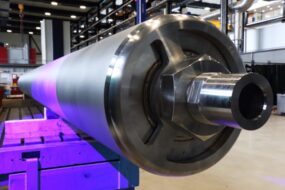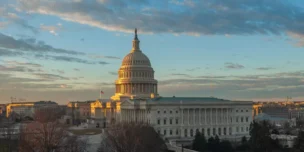It was bound to happen sometime.
The problem of Yucca Mountain has once again reared its ugly head—this time, in the form of the Supreme Court case Nuclear Regulatory Commission v. Texas. The case deals with a license the NRC awarded to allow the construction of a private, temporary nuclear waste storage facility in the Permian Basin.
The dispute hit the court in oral arguments yesterday, as the justices weighed whether the NRC had the power to award the license and, consequently, whether the license should be allowed to stand.
The problem at hand: In 2021, the NRC awarded a license to Interim Storage Partners to build an above-ground spent nuclear fuel storage facility in Andrews County, TX, a spot in the Permian Basin near the border with New Mexico.
- The commission allowed waste storage for 40 years with an option to renew.
- It allows the company to keep 5,000 (and up to 40,000) metric tons of spent fuel in dry cask storage above ground.
- The spent fuel would not be generated on-site. Instead, it would be shipped in from reactors elsewhere—an action permitted under the Atomic Energy Act.
The license was originally challenged by the Permian Basin Coalition of Land and Royalty Owners and Operators and extraction company Fasken Land and Minerals. Texas joined the challenge, citing environmental reasons.
The case progressed through the courts, most recently with the 5th US Circuit Court of Appeals in New Orleans ruling that the NRC lacked authority to issue that license. If SCOTUS upholds that decision on appeal, it will cast doubt on the NRC’s ability to license private spent fuel storage facilities anywhere in the US.
Brought to justices: The ghost of Yucca Mountain is haunting the proceedings. The conservative justices on the court, who hold a 6–3 majority, were resistant to the idea that the Yucca Mountain project, which lost government funding most recently under the Obama administration, is dead in the water. Allowing semi-permanent waste storage, in their view, undermines the hope of completing Yucca Mountain.
Justice Neil Gorsuch said that the plan for the facility “doesn’t sound very interim to me,” since there’s no path forward for Yucca Mountain and the license for the Permian Basin facility would be for 40 years with the option to renew indefinitely. “How is this interim storage that the government is authorizing here in any meaningful sense?” he asked.
- Gorsuch also expressed concern that the storage facility would be on a platform in the oil- and gas-producing Permian Basin, saying, “hopefully, we won’t have radiated oil and gas.” We’re not sure what he means by that.
Justice Elena Kagan focused on whether the NRC had the authority to issue the license, asking, “Isn’t it a little bit odd to say that the agency whose action is being challenged in court has so much control…?”
The justices will continue to weigh the facts of the case to determine whether the NRC had the authority to issue the license. The court expects to issue a decision by June.
Lead Reporter of Ignition





